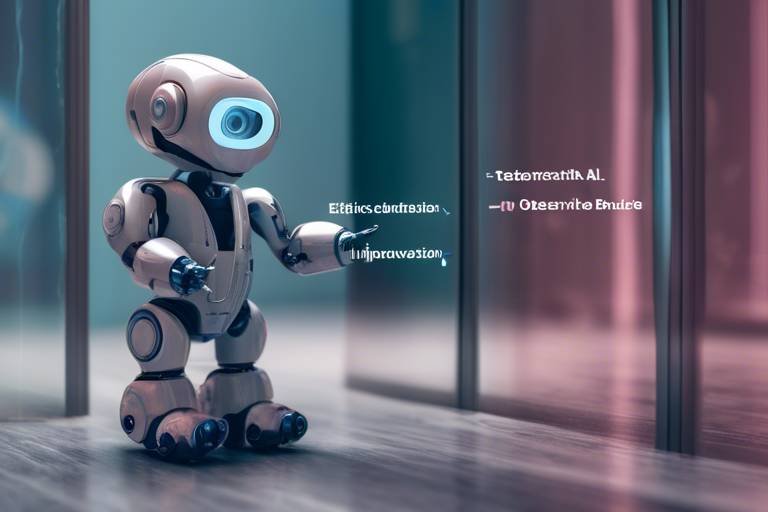Strengthening Resilience: AI Ethics In Crisis Management
In today's fast-paced world, the intersection of artificial intelligence (AI) and crisis management is more crucial than ever. As we navigate through various emergencies—be it natural disasters, pandemics, or humanitarian crises—the role of AI has emerged as a game-changer. Imagine a scenario where a hurricane is approaching your city. With the right AI tools, authorities can analyze vast amounts of data in real-time, predict the storm's path, and allocate resources efficiently. This not only saves lives but also enhances the overall resilience of communities facing such challenges.
However, while the potential benefits of AI in crisis management are immense, they come with significant ethical responsibilities. The deployment of AI systems must be done with caution, ensuring that they are not only effective but also fair and transparent. This is where the conversation about AI ethics becomes vital. It's not just about how fast we can respond but also about ensuring that our responses do not inadvertently harm vulnerable populations or exacerbate existing inequalities.
To truly strengthen resilience during crises, we must prioritize the ethical use of AI. This means developing frameworks and guidelines that govern how AI technologies are implemented in emergency situations. By doing so, we can maximize the benefits of AI while minimizing the risks associated with its use. Think of it like building a sturdy bridge; the materials and design must be carefully considered to ensure it can withstand the weight of traffic without collapsing. Similarly, our approach to AI in crisis management must be robust and well-thought-out.
As we delve deeper into this topic, we'll explore various aspects of AI ethics in crisis management, from the role of AI in decision-making to the importance of accountability and transparency. We'll also examine the critical issue of bias in AI algorithms and how it can impact crisis responses, along with strategies to mitigate these biases. In doing so, we aim to provide a comprehensive understanding of how we can harness the power of AI responsibly and ethically, ultimately leading to more resilient communities.
Artificial intelligence plays a crucial role in crisis management by providing tools for data analysis, decision-making, and resource allocation, ultimately improving response times and outcomes during emergencies.
Deploying AI in crisis situations raises ethical concerns, such as bias, accountability, and transparency, necessitating a framework to ensure responsible use while maximizing benefits in urgent scenarios.
Bias in AI algorithms can lead to unfair treatment of certain populations during crises, highlighting the need for diverse training data and regular audits to ensure equitable outcomes in emergency responses.
Examining specific case studies reveals how biased AI systems have adversely affected crisis management efforts, emphasizing the importance of ethical oversight and inclusive practices in AI development.
Implementing strategies to mitigate bias, such as diverse data sourcing and continuous monitoring, can help ensure that AI tools function fairly and effectively in crisis situations.
Establishing clear lines of accountability in AI deployment during crises is essential to address potential failures and ensure that responsible parties are held accountable for the consequences of AI-driven decisions.
Transparency is vital for building trust in AI systems used in crisis management, as stakeholders need to understand how decisions are made and the data driving those decisions to ensure ethical practices.
Effective communication of AI decision-making processes can enhance public trust and facilitate collaboration among stakeholders, ensuring that all parties are informed and engaged in crisis management efforts.
Developing regulatory frameworks for AI ethics in crisis management is crucial for establishing standards and guidelines that promote responsible AI use, ensuring ethical considerations are integrated into crisis response strategies.
- What is the main role of AI in crisis management?
AI helps analyze data, make informed decisions, and allocate resources efficiently during emergencies. - How can bias in AI affect crisis management?
Bias can lead to unfair treatment of certain populations, resulting in inadequate responses to their needs during crises. - Why is transparency important in AI systems?
Transparency builds trust among stakeholders, ensuring everyone understands decision-making processes and data usage. - What strategies can be employed to mitigate bias in AI?
Diverse data sourcing and continuous monitoring are essential strategies to ensure AI systems are fair and equitable.

The Role of AI in Crisis Management
Artificial intelligence (AI) is revolutionizing the way we handle crises, acting as a powerful tool that enhances our ability to respond swiftly and effectively. Imagine being in the midst of a natural disaster, where every second counts. AI can analyze vast amounts of data in real time, providing critical insights that can mean the difference between life and death. For instance, during hurricanes, AI algorithms can process weather patterns, predict storm paths, and even assess the impact on various communities, allowing emergency services to allocate resources where they are needed most.
Moreover, AI isn't just about crunching numbers; it’s about making informed decisions. By leveraging machine learning models, AI systems can suggest optimal responses based on historical data and current conditions. This capability is particularly crucial in scenarios where human decision-making may be hindered by stress or time constraints. For example, AI can assist in triaging patients during a medical emergency by analyzing symptoms and suggesting treatment protocols, thus accelerating the response time of healthcare professionals.
Another significant aspect of AI in crisis management is its ability to improve resource allocation. In situations like wildfires or floods, AI can help identify the most affected areas and prioritize them for aid and resources. By analyzing satellite imagery and social media feeds, AI can provide real-time updates on the situation on the ground, enabling organizations to deploy help where it’s most urgently required.
To illustrate the impact of AI in crisis management, consider the following table that highlights various AI applications and their benefits during emergencies:
| AI Application | Description | Benefits |
|---|---|---|
| Predictive Analytics | Analyzes historical data to forecast potential crises. | Proactive planning and resource allocation. |
| Real-time Data Processing | Monitors live feeds from various sources. | Immediate situational awareness and response. |
| Natural Language Processing | Analyzes social media and communications for public sentiment. | Understanding public needs and concerns. |
| Autonomous Drones | Conducts aerial surveys and delivers supplies. | Accessing hard-to-reach areas quickly. |
In summary, the role of AI in crisis management is multifaceted and transformative. As we continue to face increasingly complex challenges, the integration of AI technologies will be essential in enhancing our resilience and improving outcomes during emergencies. However, with great power comes great responsibility. It’s crucial to ensure that these AI systems are deployed ethically and transparently to maximize their benefits while minimizing potential risks.

Ethical Considerations in AI Deployment
Deploying artificial intelligence in crisis situations is not just about harnessing technology; it’s about navigating a complex landscape of ethical dilemmas. As AI systems become more integrated into emergency response frameworks, the stakes rise significantly. Imagine a scenario where a decision made by an AI could impact lives—would you trust that decision if you knew it was influenced by biased data? This is where the ethical considerations come into play.
One of the most pressing concerns is bias. AI algorithms are only as good as the data they are trained on. If the training data reflects societal biases, the AI systems may inadvertently perpetuate these biases during emergencies. For instance, if an AI system is trained primarily on data from urban areas, it may not respond effectively to crises in rural settings. This could lead to unequal resource allocation, where some communities receive faster assistance than others based purely on the data fed into the system.
Another critical ethical consideration is accountability. When AI systems make decisions, who is responsible for the outcomes? In a crisis, if an AI-driven decision leads to a negative outcome, it is essential to have clear lines of accountability. This means establishing who is responsible for the AI’s decisions—whether it's the developers, the organizations deploying the AI, or the government agencies overseeing its use. Without this clarity, we risk a scenario where no one is held accountable, leading to a lack of trust in these systems.
Moreover, transparency is vital in AI deployment. Stakeholders, including the public, need to understand how these AI systems operate. If the decision-making processes are shrouded in mystery, it can lead to skepticism and fear. For example, if an AI system suggests prioritizing one area over another during a disaster response, the public deserves to know the rationale behind that decision. Transparency fosters trust and encourages collaboration among all parties involved in crisis management.
To address these ethical considerations effectively, a robust framework is necessary. This framework should include:
- Diverse Data Sourcing: Ensuring that the data used to train AI systems is representative of all demographics to minimize bias.
- Regular Audits: Conducting audits on AI systems to assess their performance and fairness in real-time crisis situations.
- Clear Accountability Structures: Defining roles and responsibilities for all stakeholders involved in AI deployment.
- Transparent Processes: Communicating how AI systems make decisions and the data that informs these decisions.
In conclusion, as we continue to integrate AI into crisis management, we must prioritize ethical considerations. By addressing bias, ensuring accountability, and promoting transparency, we can harness the power of AI responsibly, enhancing our resilience in the face of emergencies. The goal is not only to improve response times but also to do so in a way that is fair, just, and ethical.
Q1: What are the main ethical concerns with AI in crisis management?
A1: The main ethical concerns include bias in algorithms, accountability for decisions made by AI, and the transparency of AI processes.
Q2: How can bias in AI be mitigated?
A2: Bias can be mitigated by using diverse data sources, conducting regular audits of AI systems, and ensuring inclusive practices in AI development.
Q3: Why is transparency important in AI systems?
A3: Transparency builds trust among stakeholders and the public, ensuring that everyone understands how decisions are made and the reasoning behind them.

Bias in AI Algorithms
Bias in AI algorithms is a pressing concern that can significantly impact crisis management, often leading to unfair treatment of specific populations during emergencies. Imagine a scenario where an AI system is deployed to assess risks and allocate resources during a natural disaster. If the underlying data used to train this system is skewed or lacks diversity, the AI may prioritize certain neighborhoods over others, leaving vulnerable communities without the necessary support. This situation not only exacerbates existing inequalities but also undermines the very purpose of utilizing AI in crisis situations, which is to enhance efficiency and effectiveness.
One of the main reasons for bias in AI algorithms is the reliance on historical data that may reflect past prejudices. If the training datasets include biased human decisions or systemic inequalities, the AI will likely replicate those biases in its outputs. For example, an AI model trained on data from previous emergency responses might overlook marginalized groups who were historically underserved, thus perpetuating a cycle of neglect. This raises a crucial question: how can we ensure that AI systems are designed to promote equity rather than exacerbate disparities?
To combat bias in AI, it is essential to implement strategies that promote fairness and inclusivity. Here are some key approaches:
- Diverse Data Sourcing: Collect data from a wide range of sources to ensure that all demographics are adequately represented.
- Regular Audits: Conduct periodic evaluations of AI systems to identify and address any biases that may emerge.
- Inclusive Design Practices: Involve diverse teams in the development process to bring different perspectives and experiences to the table.
By adopting these strategies, organizations can work towards creating AI systems that are not only effective but also fair and just. The goal should be to develop AI tools that enhance resilience in crisis management while ensuring that no one is left behind. Addressing bias in AI algorithms is not just a technical issue; it is a moral imperative that requires ongoing commitment and vigilance.

Case Studies of Bias Impact
When we talk about the impact of bias in AI systems, it’s not just a theoretical concern; real-world examples highlight the dire consequences of overlooking ethical considerations. One notable case occurred during the deployment of AI-driven systems for disaster response in Hurricane Katrina. The algorithms used to prioritize rescue efforts were based on historical data that reflected systemic inequalities. As a result, marginalized communities received less timely assistance compared to wealthier neighborhoods. This disparity not only exacerbated the crisis but also eroded trust in the authorities managing the response.
Another striking example is the use of AI in predictive policing, which has been employed in various cities to allocate resources during emergencies. In this case, the AI system was trained on crime data that was historically biased against certain demographic groups. Consequently, during crises, law enforcement focused their efforts disproportionately on these communities, leading to increased tension and mistrust. It's a classic case of the saying, "garbage in, garbage out," illustrating how flawed data can produce flawed outcomes.
Moreover, a study conducted during the COVID-19 pandemic revealed that AI tools used for patient triage were often less effective for individuals from underrepresented backgrounds. The algorithms, trained on data that lacked diversity, struggled to accurately assess and prioritize care for these groups, resulting in significant health disparities during a critical time. This situation not only highlights the ethical implications but also raises questions about the accountability of developers and organizations using such technologies.
To further illustrate these points, let’s look at the following table, which summarizes key case studies of bias impacts in AI systems:
| Case Study | Bias Type | Impact |
|---|---|---|
| Hurricane Katrina Response | Socioeconomic Bias | Delayed assistance to marginalized communities |
| Predictive Policing | Racial Bias | Disproportionate focus on certain demographic groups |
| COVID-19 Patient Triage | Healthcare Disparity | Inaccurate assessment of care for underrepresented groups |
These case studies serve as a stark reminder that the stakes are incredibly high when it comes to deploying AI in crisis management. The ethical implications of bias are not just academic; they have real-world consequences that can affect lives and communities. As we forge ahead in the development and implementation of AI technologies, it is imperative that we learn from these examples to create systems that are fair, transparent, and accountable.
- What is AI bias? AI bias refers to systematic and unfair discrimination in AI algorithms, often arising from biased training data.
- Why is bias in AI systems a concern during crises? Bias can lead to unequal treatment and resources being allocated inequitably, worsening the impacts of emergencies on vulnerable populations.
- How can we mitigate bias in AI systems? Strategies include using diverse training data, conducting regular audits, and involving stakeholders from various backgrounds in the development process.
- What role does accountability play in AI ethics? Establishing clear accountability ensures that developers and organizations are responsible for the outcomes of their AI systems, promoting ethical practices.
- Why is transparency important in AI systems? Transparency builds trust among stakeholders, allowing them to understand how decisions are made and ensuring ethical practices are followed.

Mitigation Strategies for Bias
When it comes to deploying artificial intelligence in crisis management, one of the most pressing concerns is the potential for bias in AI algorithms. This bias can skew outcomes and unfairly disadvantage certain groups during critical moments. To tackle this challenge effectively, we need to implement a variety of mitigation strategies aimed at ensuring that AI systems operate fairly and justly.
One effective approach is the use of diverse data sourcing. This means actively seeking out data that represents a wide array of demographics, experiences, and perspectives. By incorporating a broader spectrum of data, we can train AI systems that are more reflective of real-world complexities. Imagine trying to bake a cake with only one ingredient; it just won’t turn out right. Similarly, AI needs a rich mixture of data to understand and respond appropriately to various situations.
Another critical strategy is continuous monitoring of AI systems post-deployment. This involves regularly auditing AI algorithms to identify any biases that may have slipped through the cracks during development. Think of it as routine maintenance for a car; if you don’t check the oil or brakes, you risk a breakdown. By establishing a routine for monitoring AI performance, organizations can catch biases early and make necessary adjustments.
Additionally, fostering a culture of inclusivity in AI development teams can lead to more equitable outcomes. Diverse teams are more likely to recognize and address potential biases, as they bring a variety of perspectives and experiences to the table. It’s like having a group of friends from different backgrounds; they can provide insights that you might not have considered on your own. Encouraging collaboration among team members from various backgrounds can enhance the ethical development of AI systems.
Moreover, engaging with community stakeholders during the development and deployment phases can also help mitigate bias. By involving those who will be directly affected by AI decisions, organizations can gain valuable feedback and insights that can inform more equitable practices. This participatory approach can be likened to a town hall meeting, where community voices are heard and considered in decision-making processes.
Finally, it's essential to establish clear guidelines and frameworks for ethical AI use. Organizations should adopt best practices that outline how to address bias, ensuring that everyone involved understands their responsibilities. This could be akin to setting ground rules in a game; everyone knows what is expected, which helps maintain fairness and accountability.
In summary, while bias in AI algorithms poses significant challenges in crisis management, implementing strategies such as diverse data sourcing, continuous monitoring, inclusivity in team composition, stakeholder engagement, and clear ethical guidelines can help mitigate these issues effectively. By taking these proactive steps, we can work towards creating AI systems that not only enhance crisis management but do so in a fair and just manner.
- What is bias in AI? Bias in AI refers to systematic errors in the outputs of AI systems that result from prejudiced assumptions in the machine learning process.
- How can bias in AI affect crisis management? Bias can lead to unfair treatment of certain populations, impacting the effectiveness and equity of emergency responses.
- What are some common strategies to mitigate bias? Common strategies include diverse data sourcing, continuous monitoring, fostering inclusivity, engaging with stakeholders, and establishing ethical guidelines.
- Why is transparency important in AI systems? Transparency builds trust among stakeholders and ensures that all parties understand how decisions are made, which is critical in crisis situations.

Accountability and Responsibility
In the realm of crisis management, the deployment of artificial intelligence (AI) brings forth a myriad of opportunities, yet it also introduces complexities regarding accountability and responsibility. When AI systems are utilized to make critical decisions during emergencies, it is essential to establish clear lines of accountability to ensure that any potential failures can be addressed swiftly and effectively. After all, if an AI system makes a decision that leads to adverse outcomes, who is held accountable? Is it the developers, the organizations using the AI, or the AI itself? This ambiguity can create a significant barrier to trust and efficacy in crisis scenarios.
To navigate these challenges, organizations must implement a robust framework that delineates responsibilities among all stakeholders involved in the AI deployment process. This framework should include:
- Clear Guidelines: Establishing explicit guidelines for AI use during crises can help delineate who is responsible for what actions and decisions.
- Regular Audits: Conducting regular audits of AI systems can ensure that they function as intended and that any biases or errors are promptly corrected.
- Stakeholder Engagement: Involving all relevant parties—from developers to end-users—in the decision-making process fosters a sense of shared responsibility and accountability.
Moreover, organizations should develop a culture of accountability that encourages transparency and openness. This culture can be fostered by:
- Training and Education: Providing training for personnel on the ethical use of AI and the importance of accountability in crisis management.
- Incident Reporting Systems: Implementing systems that allow for the reporting of AI-related incidents without fear of retribution can help identify areas for improvement.
Ultimately, accountability in AI deployment is not just about assigning blame when things go wrong; it’s about creating a system where responsibility is shared, and lessons are learned. By fostering an environment of accountability, organizations can enhance the effectiveness of AI tools in crisis management while also building trust among stakeholders and the public.
- What is accountability in AI crisis management? Accountability in AI crisis management refers to the clear assignment of responsibility for decisions made by AI systems, ensuring that stakeholders understand their roles and can be held responsible for outcomes.
- Why is transparency important in AI systems? Transparency is crucial as it allows stakeholders to understand how AI systems make decisions, which helps build trust and encourages ethical practices.
- How can organizations ensure ethical AI use? Organizations can ensure ethical AI use by implementing regulatory frameworks, conducting regular audits, and engaging stakeholders in the decision-making process.

Transparency in AI Systems
In the realm of crisis management, transparency in AI systems is not just a luxury; it's a necessity. When emergencies strike, the stakes are incredibly high, and the decisions made by AI can have profound impacts on lives and communities. Imagine a scenario where an AI system is deployed to allocate resources during a natural disaster. If the decision-making process is opaque, how can we trust that the resources are being distributed fairly? This is where transparency becomes a game-changer.
Transparency fosters trust, and trust is the foundation of effective crisis management. Stakeholders—including government agencies, non-profit organizations, and the public—need to understand how AI systems operate. They must know what data is being used, how decisions are made, and what algorithms are at play. Without this clarity, skepticism can creep in, leading to hesitance in adopting AI solutions that could otherwise save lives.
Furthermore, transparency allows for more effective collaboration among all parties involved in crisis response. When everyone is on the same page, it enhances communication and ensures that all stakeholders can contribute meaningfully. For instance, if an AI system is designed to predict the spread of a wildfire, having transparent algorithms means that firefighters and emergency responders can better understand the AI's recommendations, leading to more informed decision-making on the ground.
To achieve transparency, organizations can implement several strategies:
- Clear Documentation: Providing detailed documentation of AI systems, including algorithms, data sources, and decision-making processes, can help demystify AI operations.
- Regular Audits: Conducting regular audits of AI systems ensures that they are functioning as intended and that any biases or errors are identified and corrected promptly.
- Stakeholder Engagement: Involving stakeholders in the development and deployment phases allows for diverse perspectives, enhancing the system's relevance and reliability.
By prioritizing transparency, we not only enhance the effectiveness of AI in crisis management but also promote a culture of accountability. When stakeholders understand how decisions are made, it becomes easier to hold responsible parties accountable for the outcomes. This is particularly important in crisis situations where the consequences can be dire.
In summary, transparency in AI systems is a critical component of ethical crisis management. It builds trust, facilitates collaboration, and ensures accountability. As we continue to integrate AI into emergency response strategies, prioritizing transparency will not only improve outcomes but also empower communities to engage with technology in a meaningful way.
1. Why is transparency important in AI systems used for crisis management?
Transparency is crucial because it builds trust among stakeholders, ensures accountability, and enhances collaboration during emergencies. When people understand how decisions are made, they are more likely to support and engage with AI solutions.
2. What strategies can organizations use to promote transparency in AI?
Organizations can promote transparency by providing clear documentation, conducting regular audits of AI systems, and engaging stakeholders throughout the development and deployment phases.
3. How does transparency impact the effectiveness of AI in crisis situations?
Transparency improves the effectiveness of AI by ensuring that all parties involved understand the decision-making process, which leads to better communication and more informed decisions during crises.

Communicating AI Decision-Making
When it comes to crisis management, the communication of AI decision-making processes is absolutely crucial. Imagine a scenario where a disaster strikes, and AI systems are deployed to assist in response efforts. If the public and stakeholders are left in the dark about how these systems operate, it can lead to mistrust and confusion. This is why effective communication is not just a nice-to-have; it's a must-have in today’s world of rapidly advancing technology.
To foster trust, organizations must be transparent about the algorithms they use, the data that informs these algorithms, and how decisions are made. For instance, if an AI system suggests resource allocation during a natural disaster, stakeholders need to understand the rationale behind those recommendations. This transparency can be achieved through:
- Clear Documentation: Providing comprehensive documentation that outlines the AI's decision-making process, including the algorithms and data sources used.
- Public Briefings: Organizing briefings or webinars where experts explain the AI system's functionalities and answer questions from the public.
- Feedback Mechanisms: Establishing channels through which stakeholders can provide feedback or raise concerns regarding AI decisions.
Moreover, using visual aids such as infographics and dashboards can significantly enhance understanding. These tools can illustrate how data is processed and how conclusions are drawn, making complex information more digestible. For example, a real-time dashboard displaying AI-driven predictions about resource needs during a crisis can empower decision-makers and the public alike.
But communication doesn't stop at just explaining how AI works. It also involves actively engaging with the community. This means listening to their concerns and incorporating their feedback into AI systems. When people feel heard, they are more likely to trust the technology being used in critical situations. Think of it like a team sport; everyone needs to be on the same page, working together towards a common goal, especially when lives are at stake.
In conclusion, effectively communicating AI decision-making processes is essential for building trust and ensuring collaborative efforts in crisis management. By prioritizing transparency and engagement, organizations can not only enhance the effectiveness of AI tools but also foster a sense of community and shared responsibility during emergencies.
- What is the importance of transparency in AI systems?
Transparency helps build trust among stakeholders, ensuring that everyone understands how decisions are made and that ethical practices are followed.
- How can organizations improve communication about AI?
Organizations can improve communication by providing clear documentation, hosting public briefings, and establishing feedback mechanisms.
- What role does community engagement play in AI deployment?
Community engagement allows organizations to listen to concerns and incorporate feedback, which can enhance trust and effectiveness in AI systems used during crises.

Regulatory Frameworks for AI Ethics
As we navigate the complex landscape of artificial intelligence in crisis management, the establishment of regulatory frameworks for AI ethics becomes increasingly crucial. These frameworks serve as a compass, guiding the ethical deployment of AI technologies while ensuring that the benefits are maximized and the risks minimized. Imagine a ship sailing through stormy seas; without a sturdy compass, it risks veering off course, much like how AI could lead to unintended consequences without proper oversight.
One of the primary objectives of these regulatory frameworks is to create a standardized approach to AI ethics that can be universally applied across various sectors and regions. This includes defining ethical principles such as fairness, accountability, and transparency. By establishing clear guidelines, organizations can better understand their responsibilities when deploying AI in crisis situations. For instance, regulations might require regular audits of AI algorithms to ensure they are free from bias, thus fostering a more equitable response during emergencies.
Moreover, regulatory frameworks can facilitate collaboration among stakeholders, including governments, tech companies, and non-profit organizations. This collaboration is essential to create a comprehensive strategy that addresses the multifaceted challenges posed by AI in crisis management. By working together, these entities can share insights and best practices, ultimately leading to more effective and ethical AI solutions. Picture a team of skilled individuals coming together to solve a complex puzzle; each piece represents a different perspective and expertise, contributing to a complete and coherent picture.
In addition, these frameworks can also include mechanisms for public engagement and feedback. Engaging the community in discussions about AI ethics not only builds trust but also ensures that diverse voices are heard in the decision-making process. This is particularly important in crisis management, where the stakes are high, and the impact of decisions can be profound. By allowing the public to weigh in, we can create AI systems that are not only effective but also socially responsible.
To illustrate the importance of regulatory frameworks, let’s consider a hypothetical scenario where an AI system is deployed to manage disaster relief efforts. Without a robust ethical framework, the AI might prioritize certain areas over others based on flawed data, leading to unequal distribution of resources. However, with a well-defined regulatory structure in place, the AI would be required to adhere to principles of fairness and accountability, ensuring that all affected populations receive the help they need.
Ultimately, the development of regulatory frameworks for AI ethics in crisis management is not just about compliance; it's about fostering a culture of responsibility and trust. As we increasingly rely on AI to navigate complex emergencies, it is imperative that we establish guidelines that promote ethical practices. This will not only enhance the effectiveness of crisis management efforts but will also ensure that technology serves humanity in a fair and just manner.
- What are the main principles of AI ethics? The main principles include fairness, accountability, transparency, and inclusivity, ensuring that AI systems operate without bias and with respect for all individuals.
- Why is accountability important in AI deployment? Accountability ensures that responsible parties are held liable for the outcomes of AI-driven decisions, fostering trust and encouraging ethical practices.
- How can regulatory frameworks improve AI transparency? By establishing guidelines for data usage and decision-making processes, regulatory frameworks promote transparency, allowing stakeholders to understand how AI systems operate.
- What role does public engagement play in AI ethics? Public engagement allows diverse perspectives to be considered in AI development and deployment, ensuring that the systems are socially responsible and meet community needs.
Frequently Asked Questions
- What is the role of AI in crisis management?
AI plays a pivotal role in crisis management by enhancing data analysis, streamlining decision-making, and optimizing resource allocation. This leads to quicker response times and better outcomes in emergency situations. Imagine having a super-smart assistant that can sift through mountains of data in seconds, helping responders focus on what truly matters!
- What are the ethical concerns associated with AI in crisis situations?
When deploying AI during crises, several ethical concerns arise, including bias, accountability, and transparency. These issues can affect how effectively AI tools serve diverse populations. It's like having a powerful tool that, if not used correctly, could unintentionally cause harm instead of help.
- How does bias in AI algorithms affect crisis management?
Bias in AI algorithms can lead to unfair treatment of certain groups during emergencies. If an AI system is trained on biased data, it may make decisions that disadvantage those already at risk. This is why it's crucial to use diverse training data and conduct regular audits to ensure fairness in AI-driven responses.
- What are some strategies to mitigate bias in AI?
To combat bias in AI, organizations can implement several strategies, such as sourcing diverse data and continuously monitoring AI systems. By ensuring that the data reflects a broad spectrum of experiences, AI can function more equitably in crisis situations, much like a well-balanced team that understands everyone's needs.
- Why is accountability important in AI deployment during crises?
Establishing clear accountability is essential in AI deployment because it ensures that responsible parties are held accountable for any failures or negative outcomes. This accountability fosters trust and encourages stakeholders to take AI-driven decisions seriously, knowing there are mechanisms in place to address potential issues.
- How can transparency improve trust in AI systems?
Transparency is crucial for building trust in AI systems used in crisis management. When stakeholders understand how AI makes decisions and what data it uses, they are more likely to trust its outcomes. Think of it as pulling back the curtain to show how the magic happens—everyone feels more comfortable when they see the process!
- What role do regulatory frameworks play in AI ethics?
Regulatory frameworks for AI ethics are vital for setting standards and guidelines that promote responsible AI use in crisis management. These frameworks help ensure that ethical considerations are integrated into crisis response strategies, much like a rulebook that guides players on the field to ensure fair play.



















